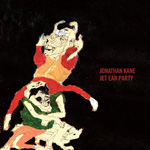|
|
 |
Dusted Reviews
Artist: Jonathan Kane Album: Jet Ear Party Label: Radium Review date: Jul. 10, 2009 |

|
|
|
 |
A short, snarky review of Jonathan Kane’s new album would go something like this: take Earth’s The Bees Made Honey in the Lion’s Skull, speed things up to actual rock tempos, cut down on the low-end fetishization, and make the drum beat the center of attention, and you’d have the Jet Ear Party. This is an oversimplification to be sure, but it’s really not that far from the truth. Both take some version of the blues, granularize it, and do things with those granules. The difference, however, lies in their starting point; whereas Dylan Carlson came to minimalist, dissected blues as an embellishment of ultra-slow motion metal, Kane came to it by way of Rhys Chatham and LaMonte Young, for both of whom he has played drums at various points. In practice this makes Kane’s music more about motion and activity as opposed to Earth’s austere, almost ascetic, focus on timbre.
Kane’s modus operandi is quite simple. He starts with a bluesy riff, a short chord progression (or the illusion of a chord progression), a bit of melody, and a shuffling rock’n’roll beat, and then repeats it, and repeats it, and repeats it, gradually accreting new material as the song progresses, building a sense of anticipation until all the pieces all the elements align in an exuberant climax about three-quarters of the way through the song.
There is nothing particularly subtle about Kane’s method, even down to the song titles: “Smear It” being the way a riff feels after five or six minutes of relentless repetition, and “Super T-Bone” describing the suped-up hot-rod feel of its high energy build, while “Blissed Out Rag” runs mildly contrafactual to its title, being more of a runaway, amped up rockabilly than a blissed-out rag. And then comes the most clever title of all, his “cover” of Sly Stone’s “Thank You Falletinme Be Mice Elf Agin,” in which Kane seems to take the message of the title seriously, since his version has next to nothing to do with Sly’s original. And has bagpipes.
Now, I don’t mean all this mild sarcasm to suggest that there’s nothing here, because there most certainly is something. There is indeed something completely satisfying about having a simple process lead you by the hand toward some ecstatic point, and there are many bands out there that work with some variant of this method (Circle comes to mind, as well as Chatham, Glenn Branca, and all of their minimalist forbearers). And his climaxes are fully fleshed out, earned (even the indulgent album closer, “Roller Coaster”) and, well, satisfyingly climactic. But since he never really ventures all that far from his bluesy licks, and since those licks don’t change all that much between songs, this album ultimately ends up feeling just a bit too static for its own good.
Taken as individual songs, or smaller groups of songs, it’s easy to let the music simply carry you off, but over the course of an album you start becoming aware of the spinning cogs that the songs are built upon. It would be easy to make a man-behind-the-curtain allusion here, but that would imply that Kane is attempting something coercive or some kind of subterfuge, when there really isn’t anything menacing about this music. It just wants to take you from one point to another and hope you have a good time in that journey. I wish there were a bit more to it than that, but I suspect that bit more would ruin the album’s balance and muddy its hard-earned simplicity.
By Dan Ruccia
|







